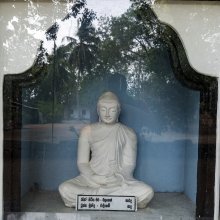Phussa, Phussā: 5 definitions
Introduction:
Phussa means something in Buddhism, Pali, Marathi. If you want to know the exact meaning, history, etymology or English translation of this term then check out the descriptions on this page. Add your comment or reference to a book if you want to contribute to this summary article.
Images (photo gallery)
In Buddhism
Theravada (major branch of Buddhism)
Source: Pali Kanon: Pali Proper Names1. Phussa
The eighteenth of the twenty four Buddhas. He was born in the Sirimauyyana in Kasi, his father being the khattiya Jayasena and his mother Sirima. AA. (i. 144) says that his father was Mahinda and that he had three stepbrothers. One of them was Uruvela Kassapa (i. 165) in this birth.
He lived for six thousand years in three palaces: Garula, Hamsa and Suvannabhara. His wife was Kisagotami and his son Ananda (or Anupama). His body was fifty eight cubits high. He left the world riding an elephant, and practised austerities for six months. A setthis daughter, Sirivaddha, gave him milk rice, while an ascetic, named Sirivaddha, gave him grass for his seat, under an amanda (or amalaka )tree. His chief disciples were Sukhita (or Surakkhita) and Dhammasena among men and Cala (or Sala) and Upacala (Upasala) among women. His personal attendant was Sambhiya. Dhananjaya and Visakha among men, and Paduma and Naga among women, were his chief lay patrons. The Bodhisatta was a khattiya named Vijitavi of Arimanda. The Buddha lived for ninety thousand years and died at the Sonarama (Setarama) in Kusinara. His relies were scattered (Bu.xix.1ff.; BuA.192f.; PvA.19f). Ambapali was his sister. Ap.ii. 613.
2. Phussa TheraHe was the son of a ruler of a province and was trained in all accomplishments. Having heard a great Thera preach, he left the world and joined the Order. He practised jhana and became an arahant. One day an ascetic named Pandarassagotta heard him preach and questioned him on the future progress of Bhikkhus. Phussas reply is contained in the Theragatha, vs. 949 80; ThagA.ii.82f.
-- or --
. One of the two chief women disciples of Tissa Buddha. J.i.40; Bu. xviii. 22.
Theravāda is a major branch of Buddhism having the the Pali canon (tipitaka) as their canonical literature, which includes the vinaya-pitaka (monastic rules), the sutta-pitaka (Buddhist sermons) and the abhidhamma-pitaka (philosophy and psychology).
Languages of India and abroad
Pali-English dictionary
Source: BuddhaSasana: Concise Pali-English Dictionaryphussa : (m.) name of a month, December-January; name of a constellation. (adj.) gaily coloured; auspicious.
Source: Sutta: The Pali Text Society's Pali-English Dictionary1) Phussa, 3 (adj. -n.) (grd. formation fr. phusati2 2; scarcely fr. Sk. puṣya (to puṣ nourish, cp. poseti), but meaning rather “speckled” in all senses. The Sk. puṣyaratha is Sanskritisation of P. phussa°) 1. speckled, gaily-coloured, °kokila the spotted cuckoo (Kern, Toev. s. v. phussa however takes it as “male-cuckoo, ” Sk. puṃs-kokila) J. V, 419, 423; VvA. 57.—As phussaka at A. I, 188 (so read for pussaka).—2. in sense of “clear, excellent, exquisite” (or it is puṣya in sense of “substance, essence” of anything, as Geiger, P. Gr. § 40 1a?) in °ratha (cp. Sk, puṣpa°, but prob. to be read puṣya°?) a wonderful state carriage running of its own accord J. II, 39; III, 238; IV, 34; V, 248; VI, 39 sq.) v. l. pussa°); PvA. 74.—rāga (cp. Sk. puṣpa-rāga) topaz Miln. 118; VvA. 111.—At Nd1 90 as v. l. to be preferred to pussa° in °tila, °tela, °dantakaṭṭha, etc. with ref. to their use by Brahmins. (Page 480)
2) Phussa, 2 (ger. of phusati1) touching, feeling, realising; doubled at D. I, 45, 54. (Page 480)
3) Phussa, 1 (fr. puṣ to blossom, nourish, etc. cp. Ved. puṣya) 1. see phussa3 2.—2. N. of a month (Dec. -Jan.) J. I, 86. N. of a lunar mansion or constellation Vv 534 (=phussa-tārakā VvA. 236).—Frequent as Np. , cp. Vism. 422, and combns like °deva, °mitta. (Page 480)

Pali is the language of the Tipiṭaka, which is the sacred canon of Theravāda Buddhism and contains much of the Buddha’s speech. Closeley related to Sanskrit, both languages are used interchangeably between religions.
Marathi-English dictionary
Source: DDSA: The Molesworth Marathi and English Dictionaryphussa (फुस्स).—interj Imit. of the noise of hissing or spitting (as of a cat or snake).
Source: DDSA: The Aryabhusan school dictionary, Marathi-Englishphussa (फुस्स).—interj Imit. of the noise of hissing or spitting.
Marathi is an Indo-European language having over 70 million native speakers people in (predominantly) Maharashtra India. Marathi, like many other Indo-Aryan languages, evolved from early forms of Prakrit, which itself is a subset of Sanskrit, one of the most ancient languages of the world.
See also (Relevant definitions)
Starts with: Phussadeva, Phussamitta, Phussaraga, Phussaratha.
Ends with: Aphussa, Phassa-na-phussa.
Full-text (+32): Pussaratha, Suvannahara, Sonarama, Titthaka, Arimanda, Surakkhita, Bhisamulaladayaka, Pussa, Pandara, Padumapupphiya, Khandaphulliya, Upasala, Hamsa, Kokila, Sappidayaka, Ti Uppalamaliya, Shala, Kutajapupphiya, Twenty Eight Buddhas, Ramsisannaka.
Relevant text
Search found 8 books and stories containing Phussa, Phussā; (plurals include: Phussas, Phussās). You can also click to the full overview containing English textual excerpts. Below are direct links for the most relevant articles:
The Great Chronicle of Buddhas (by Ven. Mingun Sayadaw)
Buddha Chronicle 18: Phussa Buddhavaṃsa < [Chapter 9 - The chronicle of twenty-four Buddhas]
Buddha Chronicle 17: Tissa Buddhavaṃsa < [Chapter 9 - The chronicle of twenty-four Buddhas]
Part 3 - The Buddha’s Delivery of The Tirokuṭṭa Sutta < [Chapter 15 - The buddha’s visit to Rājagaha]
Apadana commentary (Atthakatha) (by U Lu Pe Win)
Various other 22 Buddhas < [Part 1 - Remote preface (dūre-nidāna)]
Gaining Of Perfections By Bodhisat < [Part 1 - Remote preface (dūre-nidāna)]
Commentary on the Biography of the thera Raṭṭhapāla < [Chapter 2 - Sīhāsaniyavagga (lion-throne section)]
Mahavamsa (by Wilhelm Geiger)
Maha Prajnaparamita Sastra (by Gelongma Karma Migme Chödrön)
Appendix 3 - The story of the Brahmin called Verañja or Agnidatta < [Chapter IV - Explanation of the Word Bhagavat]
The Mahavastu (great story) (by J. J. Jones)
Dipavamsa (study) (by Sibani Barman)
